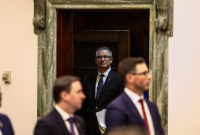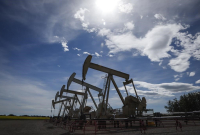Support strong Canadian climate journalism for 2025
Premier Jason Kenney says a recent bump in energy prices in the third quarter of the current budget is helping the bottom line as his government prepares to introduce its 2021-22 budget.
The budget deficit was on track to exceed $21 billion this fiscal year, but Kenney said it will now be about $14 billion.
Alberta Finance Department officials declined to confirm Kenney’s estimate.
It’s been a roller-coaster ride for Alberta’s deficit this fiscal year, which ends March 31.
The deficit was predicted to be $6.8 billion when Finance Minister Travis Toews introduced the budget last February. But a global recession, the COVID-19 pandemic and an energy price war sent that forecast soaring to $21 billion in November.
“Thankfully with significant recovery in energy prices, our revised projection has come down in our last quarterly report to about $14 billion,” Kenney said Tuesday.
“You’ll have to wait and see on Thursday for our final projection for the fiscal year that is about to end, but it will be in that range.”
Kenney said Thursday's budget will focus on getting Alberta through the pandemic and getting the economy back on its feet. There will be no new tax hikes or drastic spending reductions.
“As much as I hate deficits, now would be the worst time to cut billions of additional dollars in spending where we need it — in health care — and we need it to help stimulate economic growth."
Kenney has said the long-term plan to get Alberta back to budget balance, and build confidence with investors and bond rating agencies, will be guided by keeping the net debt to GDP ratio below 30 per cent.
He said the government will also continue to reduce per capita public sector spending to put it in line with provinces such as British Columbia, Ontario and Quebec.
The most recent budget update estimates taxpayer-supported debt this year will exceed $97 billion.
Kenney said he is buoyed by the benchmark West Texas Intermediate price for oil hovering above US$60 a barrel, but said his United Conservative government won’t budget for boom times.
“We have seen some projections of strong energy prices in the latter half of this year … but it would be irresponsible to plan for that,” he said.
“So you will see quite conservative projections for commodity prices in Thursday’s budget, in fact slightly below the private sector forecasting average, because we think that’s the prudent thing to do.”
Alberta’s economy has for decades been soaring and plunging, often within a fiscal year, as successive governments kept taxes the lowest in Canada while counting on oil and gas royalties to fill in deficit gaps.
Alberta has not had a sales tax since 1937 but Kenney has been hearing of late from economists, and last week the Business Council of Alberta, urging the province to look at a retail sales tax as a way to bring stability to budgets.
Kenney and the Opposition NDP have both said now is not the time for a sales tax.
Earlier Tuesday, NDP Leader Rachel Notley called on the government to increase support for health care in the upcoming budget.
Notley called for a repeat of the $1 billion in aid authorized last year, with another billion this year and again in 2022, to address the pandemic and reduce the backlog of surgeries delayed due to the crisis.
“Alberta’s health-care heroes have been working flat out to keep us all safe over the past year,” said Notley.
“Premier Jason Kenney and the UCP must provide them with the resources they need to keep up the fight, and to start helping the Albertans who were forced to wait for their care while our hospitals filled up with hundreds of COVID patients.”
This report by The Canadian Press was first published Feb. 23, 2021.





Comments